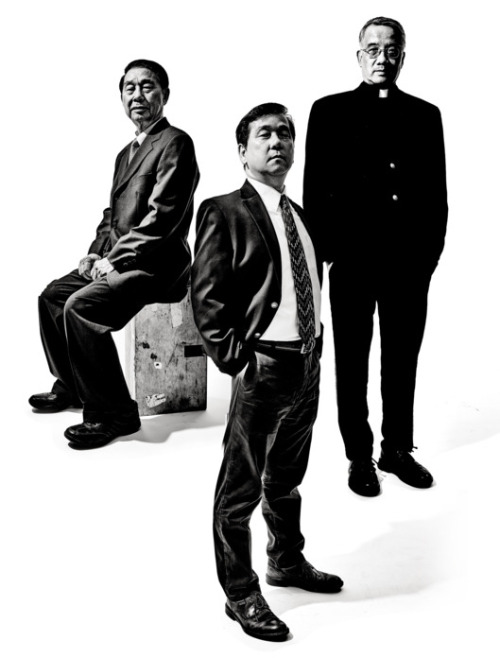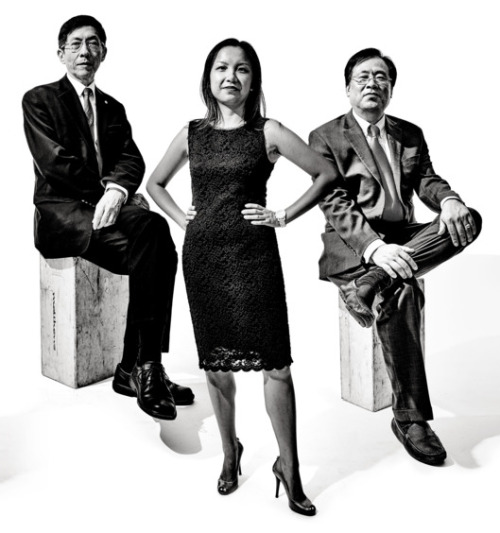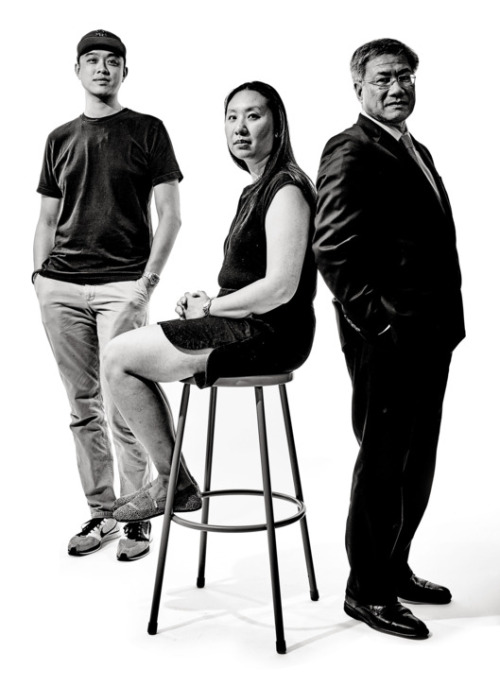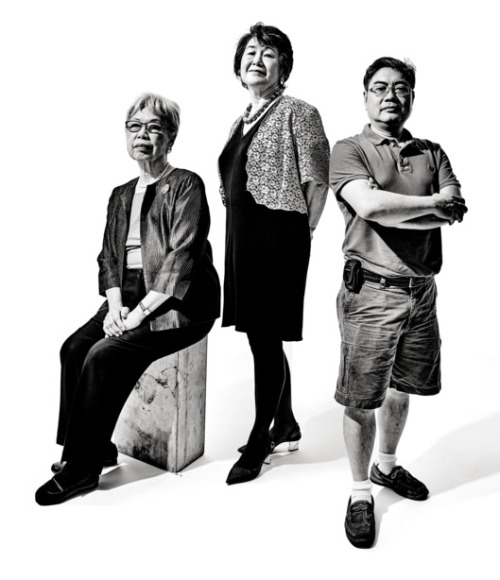How has Chinatown stayed Chinatown?THE CHINATOWN ESTABLISHMENT // Photos: Bobby Doherty/New York Mag
How has Chinatown stayed Chinatown?THE CHINATOWN ESTABLISHMENT // Photos: Bobby Doherty/New York MagazineOn the state of the neighborhood.Margaret ChinFirst Chinese-American councilperson to represent lower Manhattan, elected in 2009.“The preservation of affordable housing is important. But we’re also looking at fixing up our parks and open space. It’s just amazing how immigrant families cope with space. Nowadays, there’s a lot of sharing of apartments and multiple families living in tiny spaces, so the park is like their living room. On summer nights, people sit out there and talk to their friends because they don’t have space in their own home.”Eric NgPresident of the Chinese Consolidated Benevolent Association, which oversees the interests of some 60 family associations and other nonprofits. “Most people now coming from Fujian cannot afford to buy houses in Flushing or Brooklyn. And so, when the Chinese move into an apartment in the buildings owned by family associations, they don’t want to move out — the rent is so cheap! Here, associations bought the buildings many years ago. If you try to sell them, the whole family will jump on you.”Baayork LeeFormer Broadway performer, co-founder of the National Asian Artists Project, and director of an elementary-school theater club and a choral workshop for the elderly.“I’m teaching senior citizens English through songs and trying to bring them into the American society. A lot of the songs they’ve heard in Chinese, but now they’re hearing them in English. They’re singing Frank Sinatra ‘My Way,’ and they’re loving it.”Carl Shan LeungThird-generation practitioner of traditional Chinese medicine and founder of Kamwo Herbal Pharmacy.“A lot of people still come back to see me because their families have been using our herb shop. But our business has changed to adjust to the reality. If we only did Chinese business, we wouldn’t survive.”Christopher KuiExecutive director of Asian Americans for Equality, an organization focused on affordable housing.“Unlike Little Italy, we have a vibrant small-business community. And as we move toward the globalization of the world, I think New York Chinatown could be the international capital of the Chinese and Asian-American immigrant experience.”Bayer LeePastor of First Chinese Baptist, one of the neighborhood’s oldest churches.“When I came here in ’62, most of the Chinese were living outside of the Mott Street area. I was an example; I came from Far Rockaway. But we converged on Chinatown — for the food, for interaction, for the American Legion.Wellington ChenExecutive director of the Chinatown Business Improvement District and the Chinatown Partnership.“A neighborhood in transition is like a bus. The Germans got on, and then they got off. The Jewish population, same thing. The Italians succeeded and moved out to Howard Beach. So if you view Chinatown fundamentally as a bus, there’s nothing wrong with the current situation. The battle that we are fighting right now is: Can we stay on a little bit longer? Now, that is a trickier riddle. No group so far has managed to hang on.”Gigi LiChair of Community Board 3 and, at 33, Chinatown’s youngest political representative.“I expect continued development of high-rise buildings will further pressure families to move out, resulting in rent-subsidized apartments transitioning to market rate. My hope is that the Chinatown and Lower East Side community will come together to support a rezoning plan that can slow down some of these forces.” Jimmy ChengPresident of the United Fujianese American Association.“The second generation of Fujianese immigrants, like my son and daughters, won’t be involved in restaurants, because they have the opportunity to expand their career choices. My son is currently studying engineering, and my daughters are in finance and marketing. The future of Chinatown will be a much more diverse neighborhood, with working professionals in tech, finance, and banking.”Wilson TangInheritor of Nom Wah Tea Parlor, now in its 95th year of operation, and co-owner of Fung Tu.“When my dad first came over to America, the thought process was: Work hard and try to acquire some real estate. So he did. Now we have a building on Allen Street, the storefront at Nom Wah, another building on East Broadway.And in 30 years, I hope to be living on Allen Street. The real estate will be booming, and it will be our pad. We’ll fix it up and make it look really dope.”Christina SeidCo-owner of the Original Chinatown Ice Cream Factory, which her father started in 1977.“Chinatown is one of the hardest places to buy real estate, because Chinese people don’t move. That’s just how we are. It’s too much trouble. Plus, why would you want to sell? If the Italians still had property in Little Italy, they’d probably be holding tight to it. But the Italians don’t own the property. Now the Chinese own their property.”Glenn Lau-KeeAttorney at Kee & Lau-Kee, one of Chinatown’s oldest law firms, which his father founded in 1956.“You’ll have the occasional new buildings, some hotels, but by and large, I can’t see any tremendous change.”Peter KwongProfessor at Hunter College and the CUNY Graduate Center, and author of numerous books on Chinese-American immigrants. “Some rich Chinese don’t stand beside the poor ones, and many nonprofits are not against high-rises at all. But there are certain forces that congeal to try to protect the community, because Chinatown from the start is a place where immigrants reinvent themselves to survive.”Wing LamOne of Chinatown’s most prominent left-wing activists and co-founder and director of the Chinese Staff & Workers Association.“There are a lot of forces trying to push our people out, but we organize. Not just to keep the current situation, but to build more housing and a better economy. Other communities have already been destroyed. We’re still here, because people know that our community has fought for a long time.”Thomas SungFounder and chairman of Abacus Federal Savings Bank, which since 1984 has helped Chinese immigrants get loans, and owner of a large real-estate portfolio. “The growth of Chinatown has reached its peak because it’s geographically very much limited. On Henry Street, even the Chinese who buy and renovate properties are renting to non-Chinese at rates that the Chinese cannot afford to pay.”Virginia KeeCo-founder in 1965 of the Chinese-American Planning Council, which now serves 8,000 people with social services, including child care and English instruction.“We are our own market. Walk around Chinatown, you will see so many hairdressing salons. Who are the clients? Chinese women. We have built our town, our families, our businesses by lifting our own bootstraps.”Sandra K. LeeFirst female CEO of Harold L. Lee & Sons insurance, which Lee’s great-grandfather opened as a trading company in 1888.“Other folks in the city have come to see Chinatown as a new kind of destination. There are new hotels, fashion boutiques, medical care. It’s controlled gentrification.”Philip LamFujianese-born real-estate mogul, owner and founder of Green City Realty, active for more than 25 years.“Old Chinese say they like to keep the traditional Chinatown. But my kids’ generation, they’d like Chinatown changed. You look back to Shanghai, to Hong Kong, to other Chinese cities — they have a lot of new buildings coming up.”Ming HuangManager and server at Wo Hop, one of Chinatown’s oldest restaurants still owned by the original family. “A lot of American-Chinese style of restaurant has closed down. Our business is still doing well, because we’re in the basement. The rent is cheap. And during Christmas, people come back to visit their old neighborhood and remember, I’ve been to Wo Hop. Because after 70 years, we’re still doing the same food.”Jack TchenAssociate professor at NYU and co-founder of the Museum of Chinese in America. “If people want to see the way 19th-century New York had been, the closest you can come is Chinatown.”Charles LaiCo-founder of the Museum of Chinese in America and executive director of Immigrant Social Services, which offers programs for children.“Real-estate-property folks, they’re making a killing. But if you don’t have enough of a mixture of people to be part of that economy, it’s going to die on its own. People can’t afford it.” -- source link
Tumblr Blog : 18mr.tumblr.com
#asian american#chinese american#chinatown





